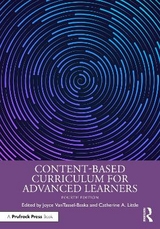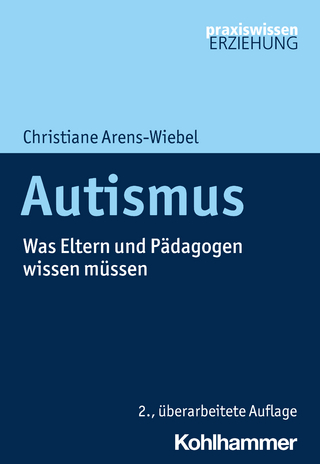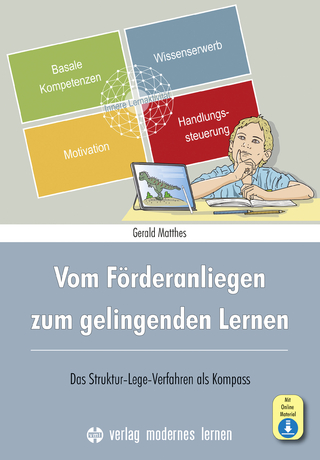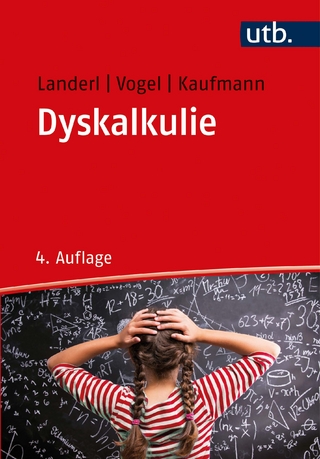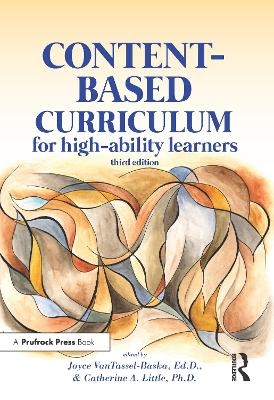
Content-Based Curriculum for High-Ability Learners
Prufrock Press (Verlag)
978-1-61821-837-7 (ISBN)
- Titel erscheint in neuer Auflage
- Artikel merken
The text identifies fundamental principles of curriculum that support advanced and high-potential learners: accelerated learning within the core content areas, use of higher order processes and products, and concept development. These emphases form threads across chapters in core content areas, including language arts, mathematics, science, social studies, world languages, and the arts. Additional chapters explore structures to support implementation, including alignment with standards, assessment of learning, counseling, and promoting exemplary teacher practice through professional development.
Joyce VanTassel-Baska, Ed.D., is the Jody and Layton Smith Professor Emerita of Education and former Executive Director of the Center for Gifted Education at William & Mary in Virginia, where she developed a graduate program and a research and development center in gifted education. She also initiated and directed the Center for Talent Development at Northwestern University. Catherine Little is an Associate Professor in Educational Psychology at the University of Connecticut. She teaches courses in gifted and talented education and in the undergraduate honors program in education, and she was recognized as a University Teaching Fellow in 2012.
Acknowledgements Preface Introduction to Content-Based Curriculum (3rd ed.). Introduction to Curriculum and Special Populations of Advanced Learners Introduction to Section I Chapter 1 Introduction to the Integrated Curriculum Model Joyce VanTassel-Baska Chapter 2 Characteristics and Curricular Needs of Advanced Learners Chapter 3 Curricular Considerations for Advanced Learners From Low-Income and Minority Backgrounds. Chapter 4 Curricular Considerations for Advanced English Language Learners Chapter 5 Curricular Considerations for Twice-Exceptional Learners SECTION II 93 The Defining Components of the Integrated Curriculum Model Introduction to Section II Chapter 6 The Role of Acceleration for Advanced Learners Chapter 7 Applying Higher Order Process Skills to Curriculum for Advanced Learners Chapter 8 Developing Authentic Products Through the Integrated Curriculum Model Chapter 9 The Use of Overarching Concepts in the Integrated Curriculum Model Chapter 10 Curriculum-Based Assessment for Advanced Learners SECTION III 217 Applications of the ICM in the Core Content Areas Introduction to Section III Chapter 11 Language Arts Curricular Considerations for Advanced Learners Chapter 12 Mathematics Curricular Considerations for Advanced Learners Chapter 13 Science Curricular Considerations for Advanced Learners Chapter 14 Social Studies Curricular Considerations for Advanced Learners SECTION IV Curriculum Applications of ICM in Other Content Areas Introduction to Section IV Chapter 15 Curricular Considerations in World Languages for Advanced Learners Chapter 16 Curricular Considerations for Advanced Learners in the Arts Chapter 17 The School-Based Psychosocial Curriculum Model Chapter 18 Teaching Leadership Skills to Gifted Learners: Lessons in Tomorrow SECTION V Support Structures for Curriculum Implementation Introduction to Section V Chapter 19 Learning From and Learning With Technology Chapter 20 Professional Development to Support Successful Curriculum Implementation Chapter 21 Aligning Curriculum for the Gifted With Content Standards and State Assessments SECTION VI The Postsecondary Experience: Continuing Curriculum Needs Introduction to Section VI Chapter 22 Beyond K–12: Honors Curriculum for High-Ability College Students Chapter 23 Using the Integrated Curriculum Model to Address Social, Emotional, and Career Needs of Advanced Learners Chapter 24 Conclusion: Implementing Innovative Curriculum and Instructional Practices in Classrooms and Schools About the Editors About the Authors Index
| Erscheinungsdatum | 06.07.2021 |
|---|---|
| Sprache | englisch |
| Maße | 178 x 254 mm |
| Gewicht | 1038 g |
| Themenwelt | Sozialwissenschaften ► Pädagogik ► Sonder-, Heil- und Förderpädagogik |
| ISBN-10 | 1-61821-837-9 / 1618218379 |
| ISBN-13 | 978-1-61821-837-7 / 9781618218377 |
| Zustand | Neuware |
| Informationen gemäß Produktsicherheitsverordnung (GPSR) | |
| Haben Sie eine Frage zum Produkt? |
aus dem Bereich
